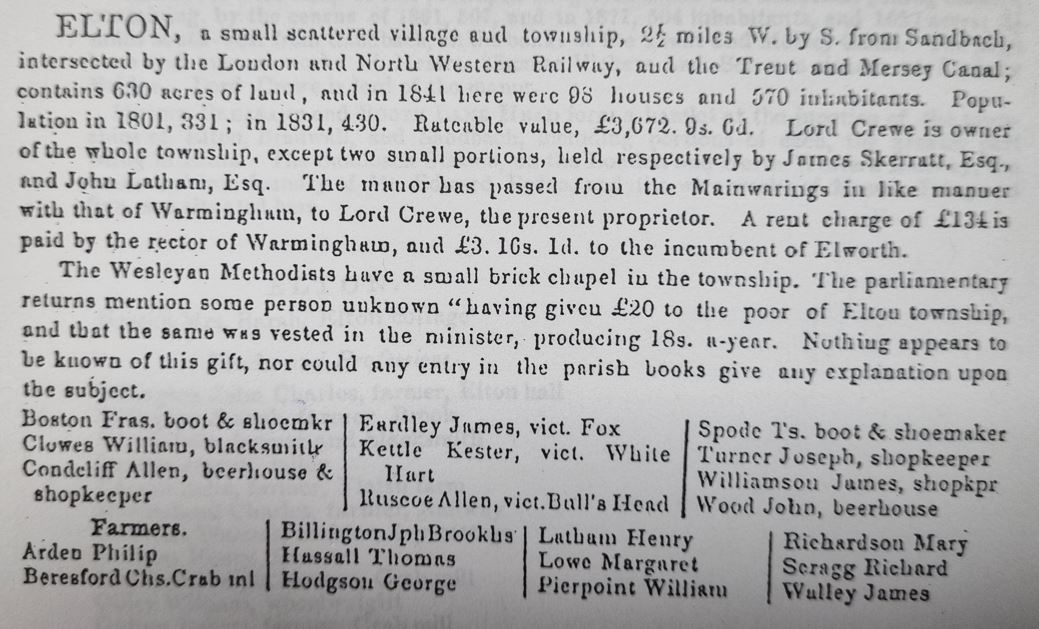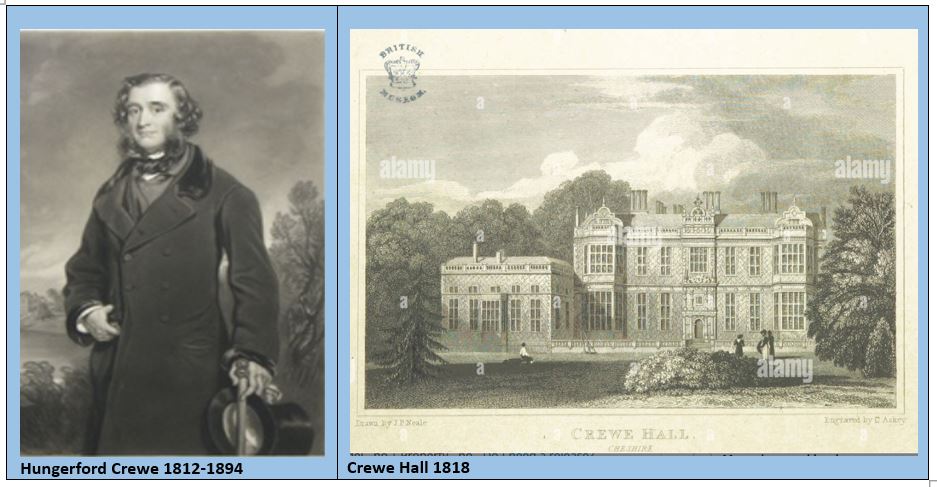As opposed to its neighbour, the township of Moston, the historic ownership of Elton is quite simple….it was effectively owned by Lord Crewe of Crewe Hall. Elton became a separate civil parish in 1936 but in 1970 it was combined with Tetton to from the single civil parish of Moston less that part of the township which had previously been transferred to Elworth.
Ownership of Moston Extracted from 1840 Tithe Map data

Bagshaw’s directory of Warmingham for 1850 describes the township as below

The Crewe estate was originally purchased in 1608 by Sir Ranulph Crewe (1558-1646) and it was he who built the hall. Having said that, it has been changed significantly since that date, in particular after a major fire in 1866. Ranulph Crewe was a lawyer by trade and Lord Chief Justice in 1626-27
Some six generations later, the estate had passed down the line to John Crewe (1742-1849) who was MP for Cheshire between 1768 and 1802. He was raised to the title of 1st Baron in 1806. John Crewe followed the “society calendar” spending the winter months in Crewe where he was a keen horseman. He was one of 50 noblemen in Cheshire and with an annual income of over £10,000 and was one of the most eligible men in London society. In London he held property in Grosvenor Square, next to the Prime Minister Lord Rockingham.
At the time, the Crewe Hall estate was of some 600 acres, including 161 acres of woodland and a lake of 50 acres. In the latter part of his life due to his own lavish lifestyle and in particular the gambling habits of his son, the family suffered severe financial difficulties which ultimately led to the sale of land in Cheshire and Staffordshire to the value of £300,000. In 1840 when the tithe maps were produced, Lord Crewe owned over three quarters of the parish of Warmingham
The early 19th century became a difficult time for the family, John Crewe (2nd Baron) after his gambling problems (said to amount to £80,000) was excommunicated from the family and went to live in Liege, Belgium. When their mother Henrietta died, the three young children were made Wards of Court and reared at Crewe Hall. Annabella was taken under the wing of her Aunt Elizabeth. John Crewe her father taking umbridge with this arrangement never spoke to her again though his elder daughter Henrietta did maintain contact.
As a result of the divided family, the 2nd Baron was written out of his fathers will with all the income and rents being diverted to Elizabeth which made her a very wealthy woman. Her net rents in 1820 was over £10,000. The estate itself was subsequently passed to his grandson Hungerford Crewe. By 1871, Crewe was the 5th largest landowner in Cheshire with land of over 10,000 acres of which 3,646 were in the parish of Warmingham.
Hungerford was born into an “unhappy inheritence” which perhaps imbibed him through his life. He was not a particularly adept academic though he did attend Oxford University. He inherited the estate aged 23 and perhaps one of his shrewdest decisions was to delegate the management of the estate to a land agent, Edward Martin from Nantwich. His family regarded him with “tolerant affection” and his tenants accepted him as the “awkward, shy, religious neurotic, gruff, autocratic” landlord that he was. Having said that, he was a reasonable landlord who looked after his tenants and made efforts to increase the quality of the lands they were working.
Hungerford was not generally in favour of the railways which were by the 1840’s starting to take off with the development of the Grand Junction Railway. He opposed many of the proposals but ultimately was forced to sell land to the railway company. He eventually agreed to the sale of land around the Crewe Arms Hotel on the understanding that a private siding would be built to take coal to Crewe Hall.
Hungerford Crewe never married and after his death in 1894, his estate passed to his nephew Robert, the son of his younger sister Annabella. Robert was a liberal politician and leader of the House of Lords. It was Robert who instigated the mass sale of the tenanted farms in the parish of Warmingham with many being sold to the sitting tenants after 1915.
Although he married twice and had 2 sons, both died young leaving no direct male heir to take on the estate. As none of his daughters showed any desire to take on Crewe Hall, it was finally sold and moved away from the family in 1936.

